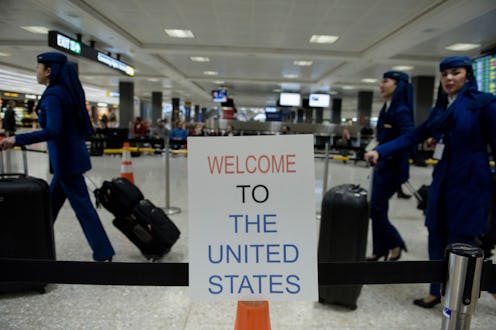
On Sunday, the Trump administration released a new travel ban, which increased the number of countries whose citizens are now restricted in their ability to enter the United States. Moreover, unlike Trump's previous travel bans, these restrictions are now indefinite.
The new travel ban, which the White House announced on Sunday evening, now includes eight countries which the administration has deemed do not meet a "minimum security baseline for entry into the United States." The ban restricts travel from several countries included the previous travel ban — Somalia, Yemen, Syria, Libya and Iran — and also adds Venezuela, Chad, and North Korea to the list of countries whose citizens now face travel restrictions. Sudan, which was previously included in Trump's last travel ban, is no longer included in list of countries with travel restrictions.
Iraq, which was included in Trump's first travel ban but removed from his second, is also not included in the list of countries whose citizens face overall bans in this third iteration of the travel ban. Though, the administration did indicate that Iraqi citizens will be subject to additional scrutiny when traveling to the United States.
Unlike the Trump administration's first two travel bans, which imposed a 90-day suspension on travel from certain countries, this third travel ban is considered indefinite and does not specify an end date. Instead, according to the Daily Beast, various officials, including the Homeland Security secretary, the attorney general, the secretary of State, and the director of national intelligence, must submit a report to the White House every 180 days that addresses whether or not the ban should remain in place as is or be altered.
The new travel ban also imposes restrictions that vary slightly from country to country. For example, as Reuters described, for Venezuela, the ban only applies to some government officials and their families, not to all Venezuelan citizens. For some countries, like North Korea and Syria, travel to the U.S. is almost completely banned, while, for others, like Somalia, citizens can travel to the U.S. to visit if they undergo enhanced security screenings, though they cannot permanently emigrate to the country.
However, despite these slight differences in restrictions, the ban does essentially prohibit citizens of seven of the eight countries listed above (excluding Venezuela) from obtaining lawful permanent residence in the U.S. and from eventually becoming eligible for U.S. citizenship, as the Daily Beast reported.
The new ban will go into effect on Oct. 18 for those not already affected by current travel restrictions. The ban will not, however, affect citizens of the aforementioned countries who currently hold valid U.S. visas — though, once these visa expire, former visa holders are subject to the new travel restrictions.
Moreover, the new ban does not affect refugees, whose entry to the United States is currently limited by the Trump administration's first travel ban. However, the administration did note that it is planning on release new guidance for refugee admissions in the next few days.
The announcement of the new travel ban came right before Trump's second travel ban was set to expire on Sunday. The second travel ban, while conceived in March, officially went into effect in June, when the Supreme Court allowed a restricted version of the ban to be implemented. Sunday marked the 90-day expiration of the implementation of this ban. Thus, this third travel ban is largely seen as a replacement for and expansion of the second ban.
This third ban could potentially also substantially affect an upcoming Supreme Court case regarding the travel ban, which is scheduled for Oct. 10. The case alleges that the travel ban specifically and unlawfully targets travelers from Muslim majority countries (something which the Trump administration denies). Many are now wondering how the addition of Venezuela and North Korea (two countries without a Muslim majority) to the travel ban will impact the court case, with The Guardian reporting that these additions could pose a substantial hurdle for the Supreme Court challenge to Trump's second travel ban.
However, many also believe that the additions of North Korea and Venezuela do not necessarily make any difference and that the ban is still essentially a ban on Muslim travelers. Indeed, Anthony D. Romero, the executive director of the American Civil Liberties Union, emphasized this point via the New York Times, saying, “Six of President Trump’s targeted countries are Muslim. The fact that Trump has added North Korea — with few visitors to the U.S. — and a few government officials from Venezuela doesn’t obfuscate the real fact that the administration’s order is still a Muslim ban."
Overall, Trump's new travel ban brings several significant changes, including the addition (and removal) of countries and a limitless timeline for how long these restrictions will be imposed. You can be certain that many will be watching closely to see if and how these new restrictions impact the upcoming Supreme Court case on Trump's second travel ban — and whether or not the administration will again revise these restrictions in the near future.